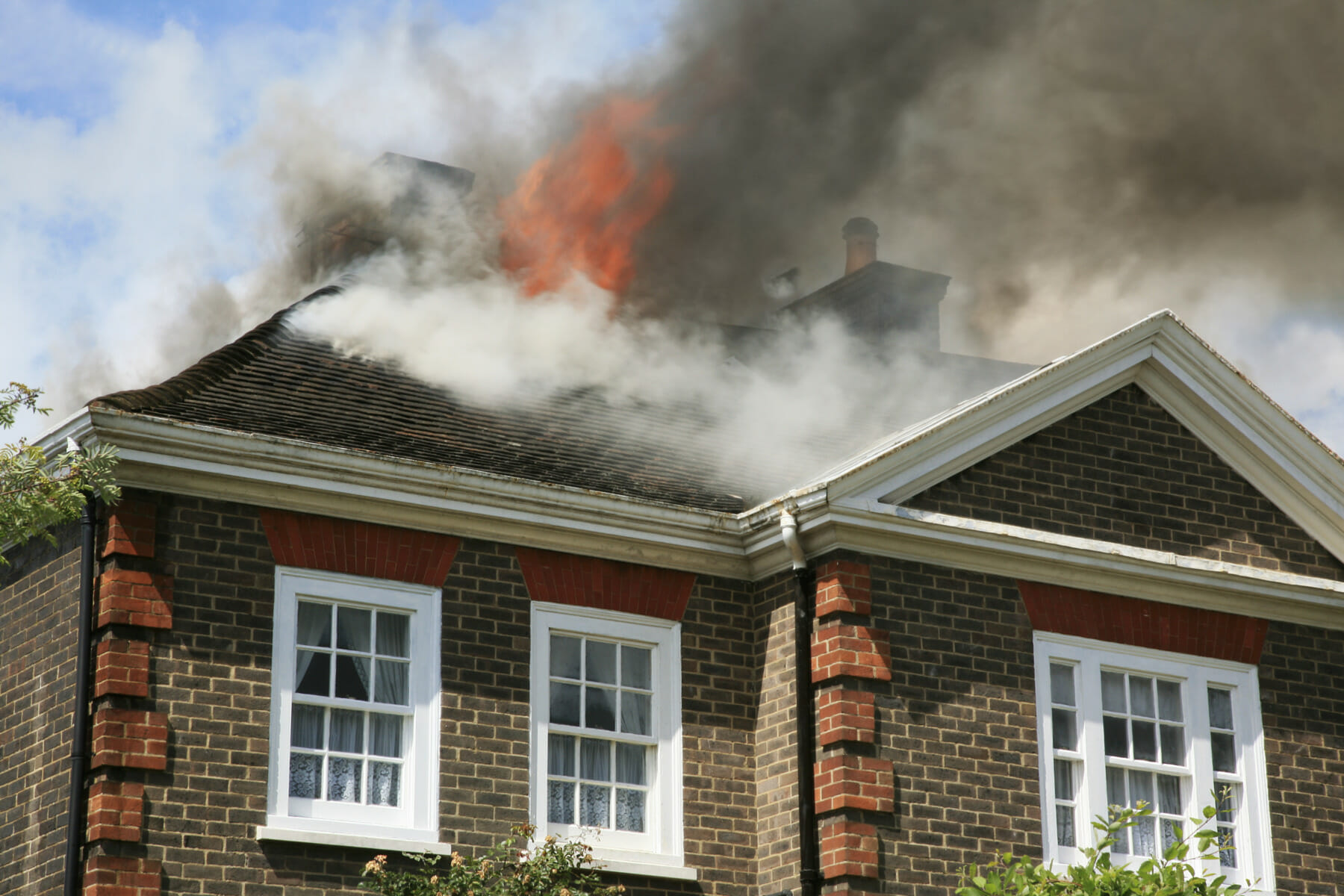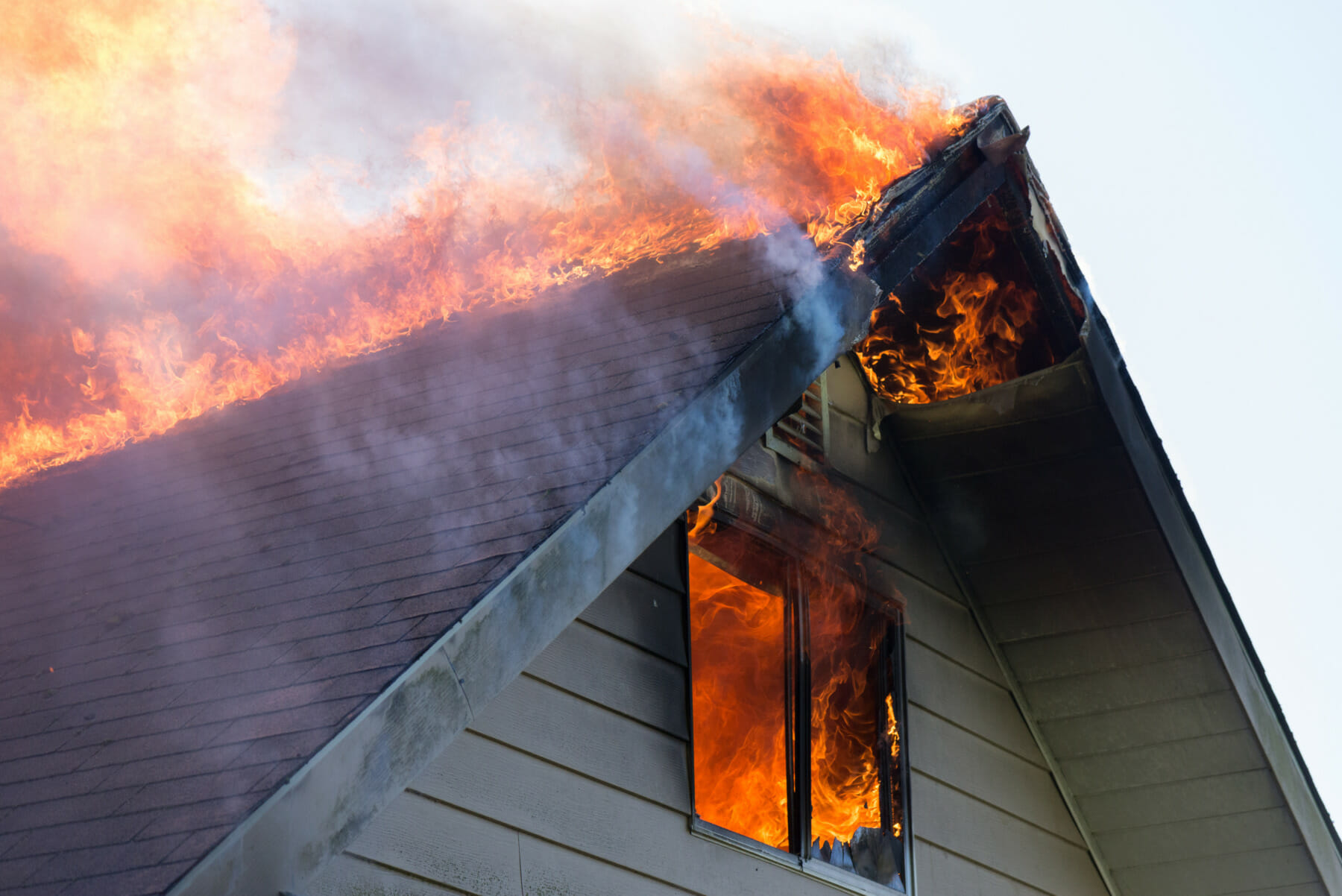How to Prevent House Fires
Your home is your haven. It is where you find peace from the rest of the world and create memories with your loved ones. Imagine losing that space to a house fire. It would be devastating. Unfortunately, this is a sad reality for many Americans every year.
According to the National Fire Protection Association (NFPA), in 2019:
- Local fire departments handled an estimated 1.3 million fires
- A house fire was reported every 93 seconds
- A house fire death occurred every three hours and 10 minutes,
- A house fire injury occurred every 43 minutes
- House fires caused approximately 3,700 civilian fire deaths, and 16,600 reported civilian fire injuries
- House fire property damage totaled an estimated $14.8 billion
In just two minutes, an outbreak of flames can become life-threatening. In three more minutes, your house can become engulfed in flames. If you are going to prevent a house fire before it happens, you should know a few things.
The fire damage restoration experts at Bull Matrix Restoration compiled a list of home fire safety tips to ensure you are doing all you can to prevent a house fire.
Simple Tips to Prevent a Fire in Your Homes
Install and Test Smoke Alarms and CO2 Detectors

A functioning smoke alarm boosts your chances of surviving a potentially fatal home fire.
First, install smoke alarms and CO2 detectors throughout your home. Once installed, test your alarms once a month by simply pressing the test button. These regular tests will ensure that each alarm is equipped to emit sound in the event of a fire.
As fire restoration specialists, we also recommend replacing any smoke alarms over ten years old (or that don’t sound when tested).
To take things a step further, double-check that you have the correct number of smoke alarms, as the US Fire Administration recommended. Every bedroom, outside each sleeping area, and on every floor of the house should have a smoke alarm installed.
Other smoke alarms and CO2 detector tips include:
- Unless you’re using 10-year lithium cells, replace batteries every two years
- Install smoke detectors on every level of your home, including the basement
- Replace the entire smoke alarm device every ten years or as directed by the manufacturer
- Do not disable a smoke alarm for any reason, including cooking
- Interconnect all alarms for maximum protection
Check and Clean Ductwork
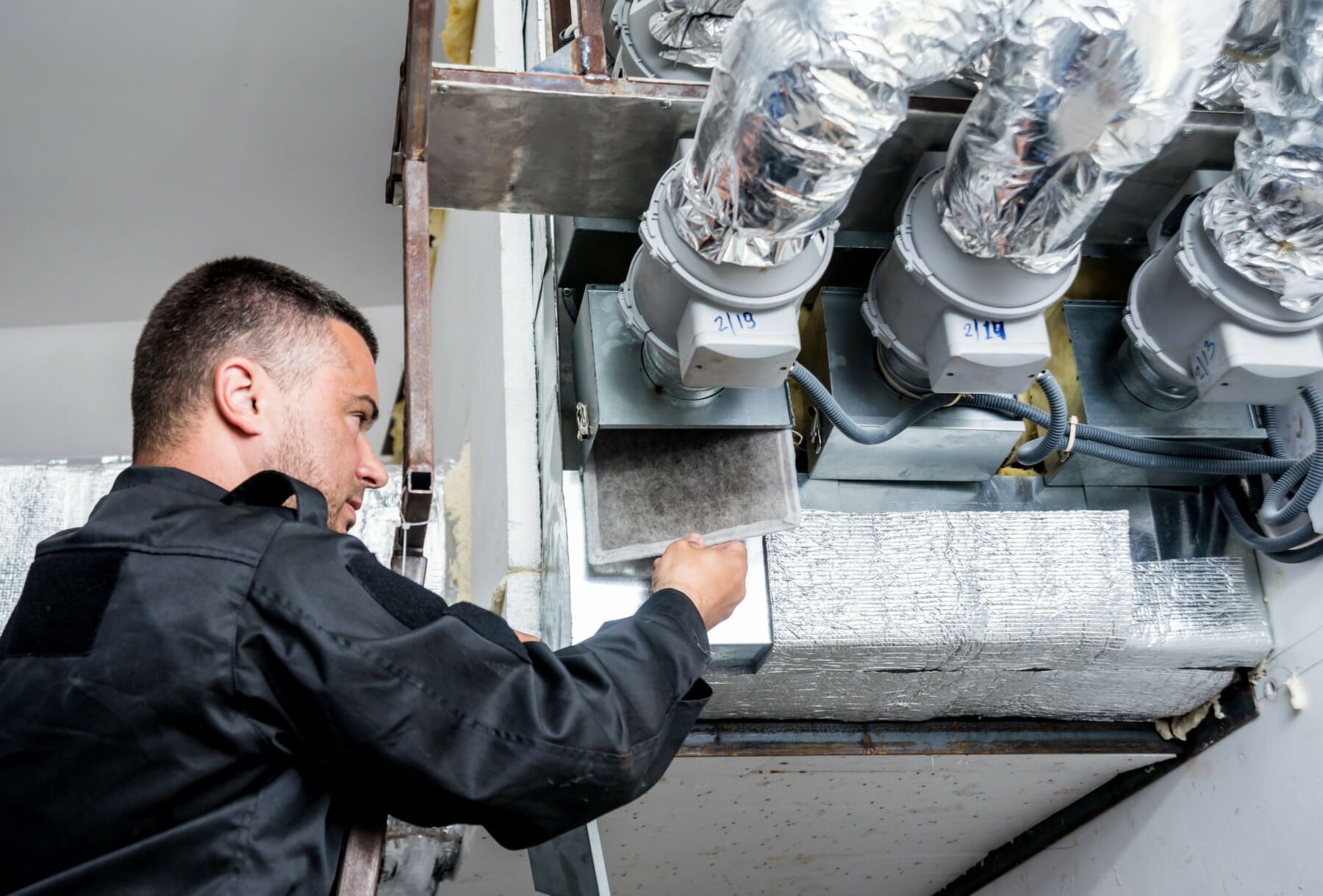
Dirty air ducts are a fire hazard. Over time dust accumulates in your ductwork. This debris is full of dry, combustible materials that can quickly ignite if it becomes extremely heated. This risk is particularly significant during the summer when ducts get warmer.
A surefire strategy to reduce your risk of a house fire caused by debris in your ductwork is to get rid of any dust accumulated in these spaces. You should regularly check and clear your ductwork of any collected debris.
Here is a step-by-step guide to clean your ductwork properly.
- Remove the screws from air duct covers and return-air grill plates.
- Cover up your supply vents that supply heat or air to the rooms with paper towels.
- Set your thermostat to the “fan on” position.
- Loosen dust in ducts.
- Clean supply registers by running a vacuum over the register.
- Use a damp microfiber cloth to wipe the interior of the duct clean.
- Clean the return registers by sweeping them out as far back as you can reach.
- Shut off fan and furnace.
- Use your vacuum to sweep up the dust built up in the blower compartment and return the air boot.
- Replace your furnace filters eat least once a month.
Along with regularly cleaning your ductwork on your own, you should receive a professional service once or twice a year. As fire damage restoration experts, we recommend our vendor, Green Home Air, Utah duct cleaning technicians with 30 years of experience. A few of the services they offer include air duct cleaning, dryer vent cleaning, and mold remediation industries.
Preventing Kitchen Fires
One of the rooms most notorious for house fires is the kitchen. All it takes is a few seconds for a fire to break out in your kitchen when you are cooking. When you are frying, grilling, or broiling food, stay in the kitchen. Never leave cooking food unattended. If you must leave the room (even for a few minutes), turn off the burner.
It would help if you also kept your appliances clean and in working order. Clean your toaster, microwave, and oven of any crumbs or gunk. If your appliances are making noises or not working properly, call a maintenance specialist.
When these appliances aren’t in use, unplug them. Even if you aren’t using your toaster or microwave, faulty wiring can cause a house fire.
You should also keep a fire extinguisher on hand and learn how to use it. Every month, check to ensure the needle on the pressure gauge is in the green area. If it isn’t, replace it. If there are any cracks in the hose or handle or a clogged nozzle, you should also get a replacement.
Other kitchen safety tips to keep in mind include:
- Store towels away from the stove. If left too close to a burner, both cloth and paper towels can quickly catch fire.
- When cooking, wear short, close-fitting, or tightly curled sleeves. Long, flowy sleeves, scarves, and neckties can catch fire if dragged over a hot burner or dipped into a boiling pot of water. It’s also a good idea to tie long hair back when cooking.
- Keep grills at least ten feet away from siding and deck railings, as well as out of the way of eaves and overhanging trees.
In the event of a kitchen fire, know what to do. Here are a few examples to get you started:
- If the oven or microwave is on fire, close the door. Closing the door should reduce or eliminate the fire completely due to a lack of oxygen. Call 911 if the fire does not die down.
- Fires that start on the stovetop can require several different methods to extinguish. If a pan catches fire, place a cover on it with a potholder or oven mitt. Then, remove the pan from the heat, following the same technique of cutting off oxygen to the flames. Use your fire extinguisher if you don’t have a lid.
- If you started a grease fire, never use water to put it out. Pouring water on it has the potential to aggravate the situation and make the fire worse. Instead, use baking soda or salt to extinguish the flames. You should never use flour, either, as it can cause an explosion.
- If these measures fail to properly extinguish the fire, call 911 and leave your house right away.
Preventing Electrical Fires
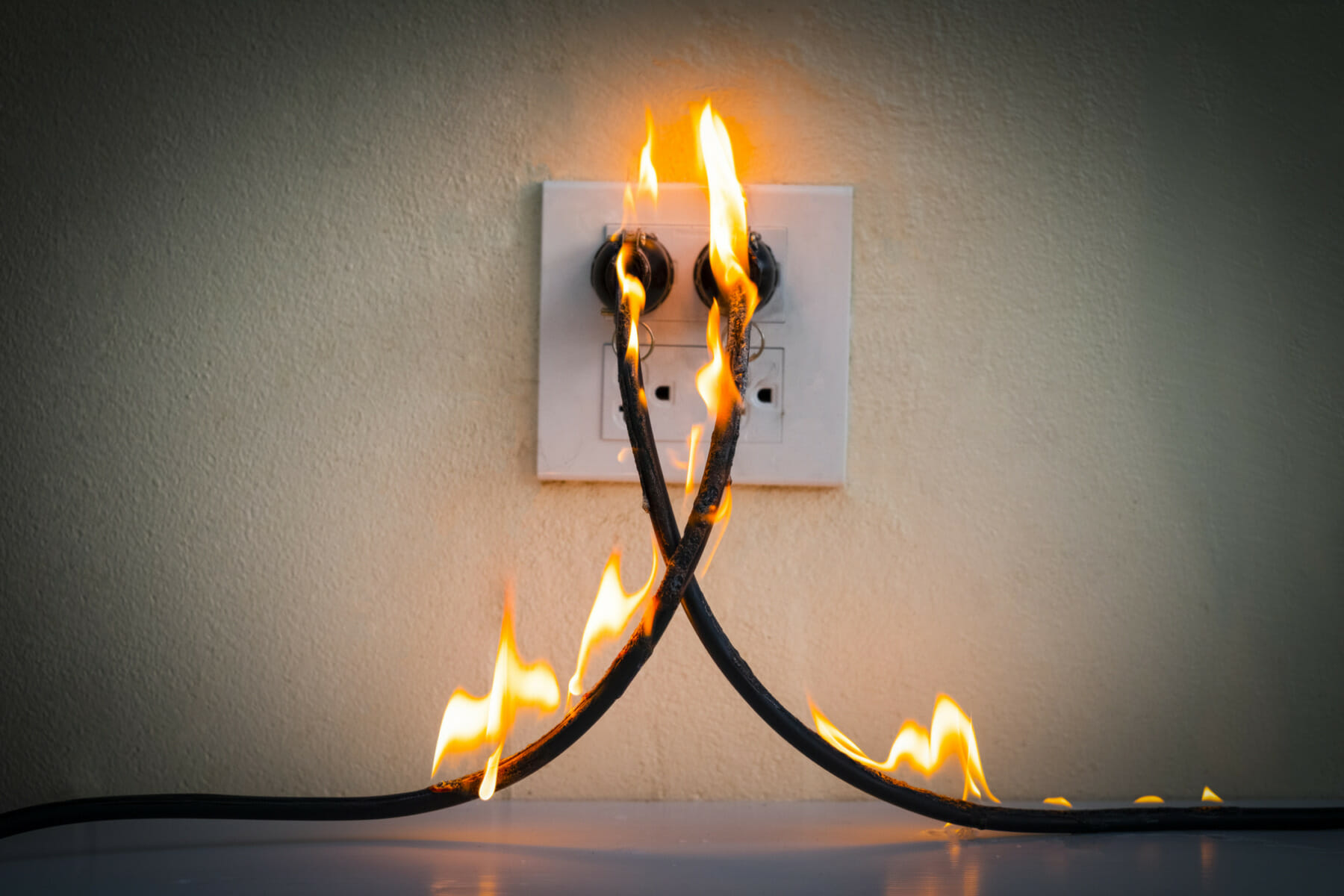
Running electricity can be another culprit for starting a house fire. As you plug something in, check to see if the cord has any fraying or chew marks. If you notice any damage, replace the wires as soon as possible.
You should also check where you place your cords. Since electricity runs through these cords, it can cause them to warm. Avoid placing your cords under rugs or furniture, near flammable fabrics, or in confined spaces like between furniture and walls.
Other electrical problems to look out for to avoid house fires include:
- Replace any worn, outdated, or damaged appliances as soon as possible.
- Use only a three-slot outlet if an appliance has a three-prong plug. Never try to squeeze it into a two-slot outlet or an extension cord.
- Immediately turn off and replace any light switches that are hot to the touch or flickering lights.
Combustible Items and Storage
There are common household items that can combust under certain conditions. It would help if you understood how to properly store flammable products, such as household cleaners and cosmetic items, like hairspray and shaving cream. Keep these items away from heating sources and stored in cool spaces.
Other items you should check to reduce your risk of starting a house fire include dryers, portable space heaters, electric blankets, and combustible items stored in the garage.
Preventing Lint Fires from Dryers
While people are doing their laundry, they are usually in a rush to finish. Unfortunately, rushing through your daily tasks can leave you vulnerable to a house fire. Instead, take your time to clear out your lint trap after each laundry load.
Depending on the sort of dryer you have, you should also inspect it once a year. Look behind the machine to ensure that no lint or small clothing items like socks are back there.
Portable Space Heaters
Many homeowners use portable space heaters when there is cold weather, especially during a Utah winter.
If you are using a portable space heater, keep it at least three feet away from other combustible items. If you are using a kerosene heater, only use crystal clear K-1 kerosene. Do not overfill these heaters and use them in a well-ventilated room.
You should also only purchase a portable space heater that a nationally recognized lab evaluated, such as Underwriters Laboratories. You can check to see if Underwriters Laboratories approved your portable space heater on their approved product database.
Along with verifying that the space heater is safe, you should check that the portable heater has a thermostat control mechanism that will shut off automatically if it falls over.
Electric Blankets
A popular household item that many people accidentally leave running is the electric blanket. As fire restoration specialists, we recommend only using electric blankets that come equipped with an auto-shutoff feature. It would be best to unplug your electric blanket as soon as you are done using it. Along with ensuring you are using your electric blanket properly, it would be best to avoid plugging too many things into wall outlets and power strips at the same time.
Outdoor Items
There are several flammable objects often stored outside, whether it is in the garage or shed. Common culprits of house fires that originated outside include are grills, bonfires, and fireworks. But did you realize that potting soil can sometimes cause a house fire, as well?
Fertilizer and some potting soil brands include combustible chemicals that can ignite when exposed to heat or an open flame. To keep your home safe, store gardening supplies in a cool, dry place.
You should also keep combustible materials like grills away from heat sources. Designate a cool, dark cupboard for combustible items, and make sure everyone in the family knows where to find them.
Along with your gardening and grilling supplies, check where you store items in your garage.
It is best to keep your paint and gasoline in their original containers. If you open a paint container, store it firmly closed and upside down to allow the paint to seal the container.
Store gasoline in gasoline-specific containers. If the container cracks or leaks, replace it with a new container made out of the same material.
More Fire Prevention Tips
- Never heat your home with a stove range or oven.
- Keep flammable liquids and combustible liquids away from heat sources.
- Never use a portable generator inside the home and only refuel the generator outside in a well-ventilated setting.
- Keep matches and lighters out of reach and sight of children, preferably in a closed cabinet.
- Even if it’s only for a few minutes, never leave young children unsupervised near running stoves or flammable objects.
Open Flame Safety – Fireplaces, Woodstoves, and Candles
Occasionally, homeowners will have an open flame in their homes. These open flame sources include fireplaces, woodstoves, and candles. These items are wonderful, but they can also cause house fires. At Bull Matrix Restorations, we regularly provide fire restoration services on homes damaged by open flames. To ensure your home stays safe, here is a short list of tips to follow to prevent candles or fireplaces from causing a house fire.
- Annually inspect and clean woodstove pipes and chimneys, and check for damage or obstructions monthly.
- Use a fireplace screen that is both sturdy enough to stop rolling logs and large enough to cover the entire fireplace opening to capture flying sparks.
- Before leaving the house or going to bed, be sure the fire or candle is completely out.
- Make sure to give the ashes from your fire plenty of time to cool before disposing of them. You should also put them in a metal container that you only use for ash disposal.
- Keep candles and open flames away from blankets and other flammable objects. If you have pets, place the candles in areas that are far out of their reach.
- Keep a fire extinguisher nearby.
Recovering from Fire and Smoke Damage
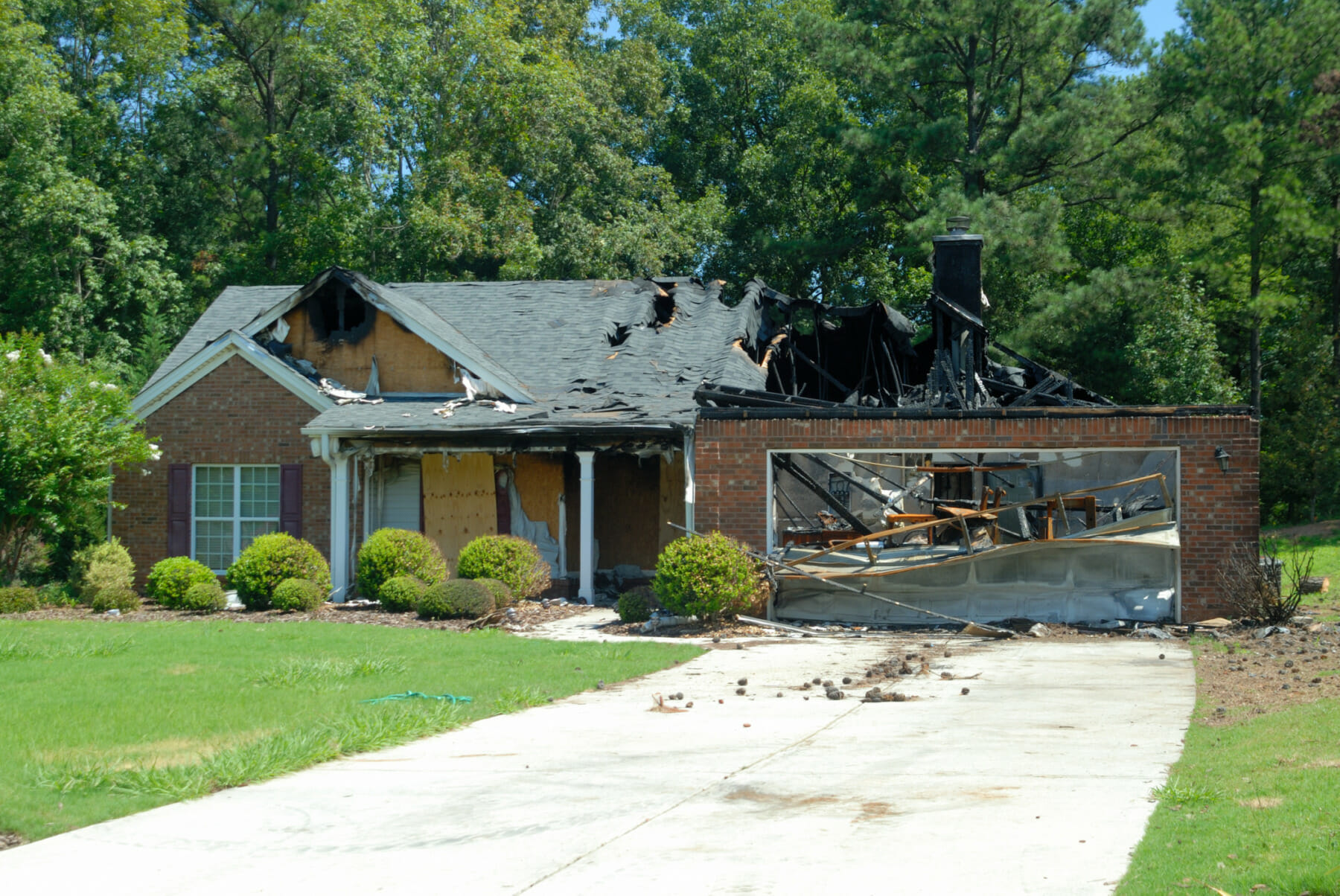
Even after taking all these house fire precautions, accidents can still happen.
If you recently experienced a house fire, it’s critical to have a specialist assess your property for fire and smoke damage. Bull Matrix provides fire damage restoration services for many properties, including homes, businesses, high-rise hotels, government buildings, hospitals, and more.
Our team has years of experience restoring Utah homes. As highly trained IIRC certified experts, we offer a wide variety of smoke and fire damage restoration services. We specialize in house fire and smoke damage restoration, use cutting-edge technology to solve air quality concerns and take the required procedures to clean or rebuild the property.
Our experts can restore most items that haven’t been in direct contact with fire. We employ dehumidifiers, generators, air scrubbers, and other equipment to prevent damage to your windows, doors, roofs, and other structures.
We can also conduct temporary roof repairs to protect your home and belongings from future harm. No matter what you need, Bull Matrix is here to help. Together, we can start to rebuild your life.
To learn more about our fire restoration services, call us today on our 24/7 emergency service line at 801-829-9875.

